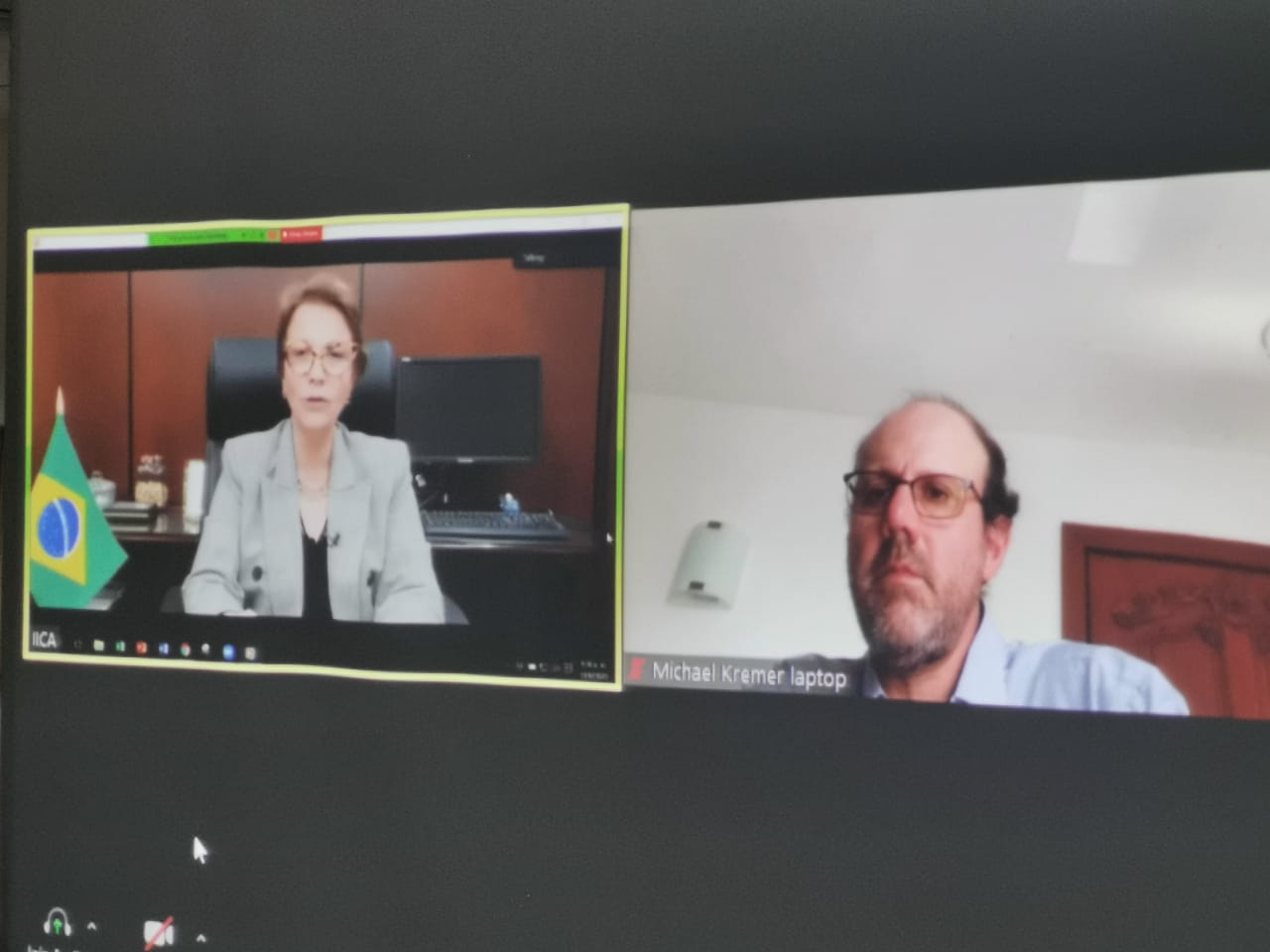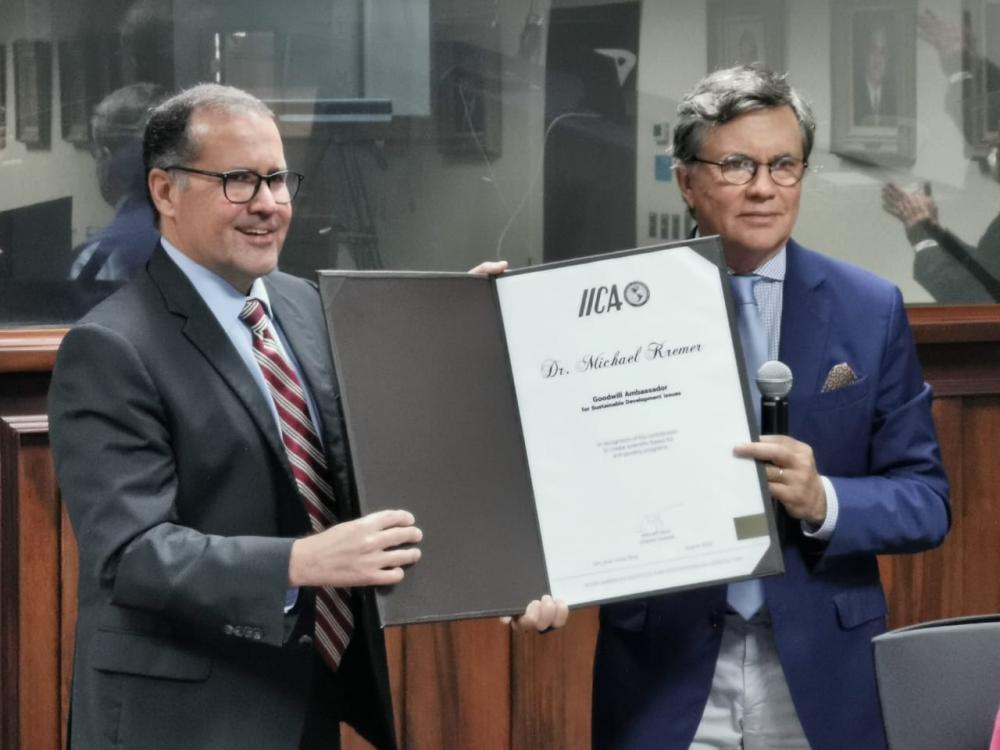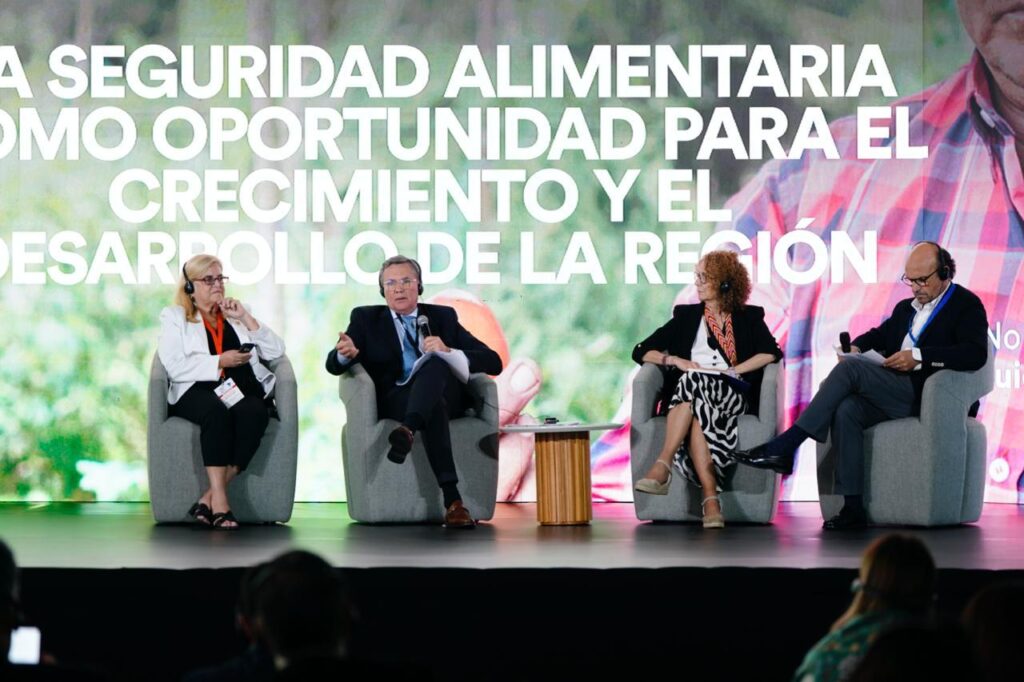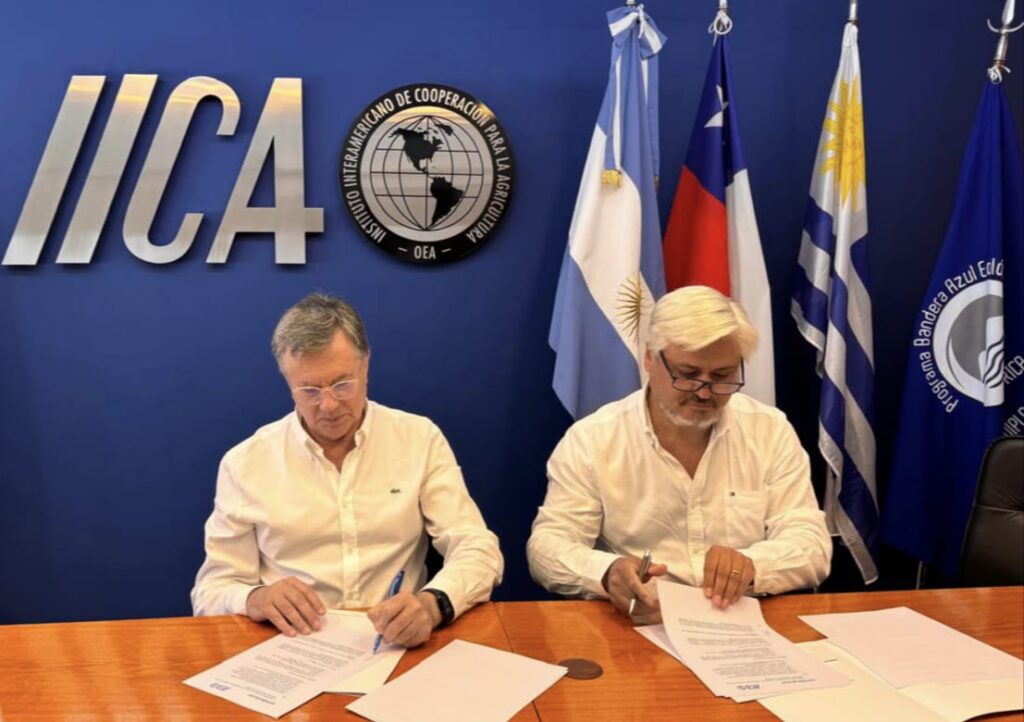Lo anunció la ministra de Agricultura de Brasil, Tereza Cristina, en la ceremonia en la que el Nobel de Economía 2019 se convirtió en Embajador de Buena Voluntad del IICA. El foco será la agricultura familiar.

San José, 18 de agosto de 2020 (IICA). Brasil se convertirá en el primer país de América Latina en recibir las soluciones de tecnología digital para el desarrollo del agro impulsadas por el Nobel de Economía 2019 Michael Kremer.
El foco inicial será la asistencia remota a miles de pequeños productores brasileños de la región Nordeste que viven de la cría de ovinos y caprinos, y del cultivo de maíz y frijol.
El anuncio fue hecho por la ministra brasileña de Agricultura, Ganadería y Abastecimiento, Tereza Cristina, en la ceremonia virtual en la que Kremer recibió el título de Embajador de Buena Voluntad del IICA, el Instituto Interamericano de Cooperación para la Agricultura (IICA), socio en la iniciativa que llevará información a través de la telefonía celular para que pequeños productores agropecuarios puedan incrementar productividad, con el consiguiente aumento de sus ingresos y calidad de vida.
“Estamos construyendo el programa de asistencia técnica y extensión rural digital para traer nuevas herramientas que puedan ampliar la base de atención a los pequeños productores. El IICA, que representa cada una de las diferentes agriculturas de las Américas, con esta alianza con Michel Kremer trae este gran instrumento de desarrollo. Hoy el conocimiento es uno de los principales insumos para el crecimiento de la agricultura y para el aumento de los ingresos para el agricultor”, dijo en la ceremonia la ministra Tereza Cristina.
“Esta alianza trae metodologías compuestas por procesos ágiles y más rentables, con una tecnología ya probada y evaluada por un Premio Nobel de Economía. Es una manera inteligente de enfrentar los efectos y las amenazas de la pandemia sobre la seguridad alimentaria y de continuar innovando, que es la marca del agronegocio brasileño. Agradezco el apoyo del Director General del IICA, Manuel Otero, para esta nueva alianza”, agregó.
Kremer es uno de los fundadores de Agricultura de Precisión para el Desarrollo (PAD, por sus siglas en inglés), organización que llevó a agricultores familiares de Asia y África servicios agrícolas digitales de asistencia técnica y extensión rural, claves para que el eslabón más débil del sector agropecuario pueda obtener mejores rendimientos y un aumento de ingresos.
El IICA firmó en junio un acuerdo con PAD para implementar en América Latina y el Caribe el método probado con gran éxito en países como India, Etiopía y Kenia, con los objetivos de reducir la pobreza rural y promover la inclusión social y productiva y el desarrollo económico y ambiental sustentable.
La alianza entre el Ministerio de Agricultura, Ganadería y Abastecimiento (MAPA) de Brasil, PAD y el IICA, permitirá usar la exitosa metodología para mitigar los impactos de la Covid-19, que impide los servicios presenciales de extensión rural, y mejorar la producción y el rendimiento de productores que viven de las agriculturas de caprinos, ovinos, maíz y frijoles.
En un plazo de dos años, el MAPA, PAD y el IICA proveerán a unos 200.000 pequeños agricultores del Nordeste de Brasil asistencia técnica y extensión rural vía mensajes de telefonía fija y celular, incluso utilizando tecnología 2G disponible en áreas remotas del campo brasileño, llevando orientaciones técnicas sobre plagas, cosechas, buenas prácticas y salud animal desde una multiplataforma ya probada, capaz de transmitir información a través de SMS.
La tecnología digital ofrece la oportunidad de brindar una atención personalizada a distancia a un costo infinitamente menor al del sistema vigente durante décadas, algo que se hace aún más necesario en momentos en que el efecto destructivo del Covid-19 llegó al modelo tradicional de extensión.
“El trabajo de PAD brinda un servicio robusto para enviar información técnica directamente a los hogares de los agricultores indicando cómo preparar el suelo, cómo cuidar la producción, las condiciones climáticas, cómo controlar y manejar plagas y enfermedades, entre otros. Al utilizar la metodología PAD, gobiernos e Instituciones pueden enviar un mensaje semanal con orientación técnica a un costo tan bajo como USD 1,5 por familia por año, que es 200 a 300 veces menor que los costos de los servicios tradicionales de asistencia técnica”, dijo el Director General del IICA.
“Estos resultados brindan nuevas perspectivas y oportunidades a los más de 17 millones de pequeños agricultores que viven en América Latina y el Caribe. Estoy realmente orgulloso de los logros alcanzados por el IICA en los últimos meses, en medio de esta terrible pandemia. Entre estos, se encuentra la firma de un entendimiento con PAD y nuestra capacidad de convocar muchas reuniones con nuestros países miembros, en búsqueda de nuevas oportunidades para brindar un servicio innovador de alto nivel a la región”, agregó Otero.
Por su parte, el ministro de Agricultura y Desarrollo Rural de Colombia, Rodolfo Zea Navarro, elogió la iniciativa de PAD y el IICA.
“Estamos convencidos de que la reactivación económica tendrá que ser jalonada e impulsada por el sector rural. Estamos seguros que con la ayuda del IICA y con todo el conocimiento y experiencia del Profesor Kremer en el mundo, podremos aplicar herramientas tecnológicas al desarrollo agropecuario y vamos a lograr mejorar la productividad de todos los productores”, indicó.
“Veo una gran oportunidad de hacer extensión y agricultura de precisión a través de mecanismos de comunicación y elementos audiovisuales que puedan llegar a nuestros campesinos en zonas apartadas de Colombia, con la ayuda del IICA y con la experiencia que Kremer ha tenido en el mundo”, añadió el ministro.
La experiencia de PAD y la situación de la agricultura familiar en Brasil
Estudios de PAD en países de Asia y África muestran que los servicios remotos de extensión rural generaron aumentos de productividad superiores al 11% y que el envío de información por SMS incrementó en 22% las posibilidades de que los agricultores utilicen los insumos adecuados.
“Las informaciones entregadas en gran escala a través de celulares pueden mitigar los efectos negativos de la pandemia y hacer avanzar la lucha contra la pobreza. Yo cofundé PAD para capacitar a los agricultores con herramientas digitales e informaciones para mitigar la pobreza y mejorar la productividad agrícola. Estoy entusiasmado con la escala y la experiencia que esta colaboración traerá para servir a los agricultores pobres de Brasil”, dijo Kremer, quien aseguró que el sistema de PAD también se nutrirá de la información de los propios agricultores.
En Brasil, cerca de la mitad (46,5%) de los establecimientos rurales tienen conexión a internet, pero apenas 13% cuenta con conexión de banda ancha, las cuales tienen una mayor velocidad y, por tanto, permiten el uso de herramientas robustas para el desarrollo rural, como la agricultura de precisión, que implica la transmisión de un alto volumen de datos (Big data).
Según datos oficiales del 2020, alrededor del 51% de los hogares rurales de Brasil tiene acceso al servicio celular móvil para uso personal, lo que permite acciones basadas en la comunicación directa con los agricultores, como realizar llamadas telefónicas, enviar y recibir mensajes SMS (servicio de mensajes cortos) y correo electrónico, las cuales se pueden realizar en base a la estructura de comunicación existente.

El uso de esta estructura es suficiente para brindar a los agricultores de la región una orientación técnica basada en tecnologías simples.
El contenido que brinden estos servicios será elaborado por veterinarios, agrónomos, zootécnicos, investigadores, especialistas en ganadería y afines, con aportes del IICA, MAPA y otros socios estratégicos, como las respectivas unidades de Embrapa que cuentan con conocimientos específicos para las cadenas seleccionadas, agencias del Estado y universidades.
El contenido se personalizará en función de una amplia variedad de características de la propiedad y del agricultor, como ubicación geográfica, y otros temas como suelo, clima, eventos extremos, seguridad hídrica, entre otros.
La agricultura familiar ocupa el 23% de la superficie de producción del país y emplea directamente a 10 millones de personas, 67% del total de personas dedicadas a la actividad agrícola. Además, produce cerca de un tercio del PIB agropecuario del país.
El Nordeste es la región brasileña con mayor número de agricultores familiares, con aproximadamente 2,2 millones, o el 45,8% del total. En la región, se destaca la producción de pequeños rumiantes, como cabras, ovejas, y también la producción de granos, destacando maíz y variedades de frijol. Entre las cadenas priorizadas por la agricultura familiar en el Nordeste, el ovino de carne y leche tiene un rebaño de 16 millones de animales.
Otra actividad de gran relevancia para la región es el cultivo de frijol, que ocupa aproximadamente 1,62 millones de hectáreas, mayor que la suma de las áreas cultivadas en las regiones Sur, Sudeste y Centro-Oeste, con 1,37 millones de hectáreas. La productividad en el Nordeste, sin embargo, es la más baja del país.
En el contexto de la pandemia de Covid-19, la metodología desarrollada por PAD, de enviar mensajes de orientación técnica a pequeños productores de varios países, permitió que las actividades continuaran en países como Etiopía, India, Pakistán, Kenia, Ruanda, Uganda y Zambia.
PAD realizó extensas encuestas con agricultores en India, Kenia, Pakistán y Uganda, para recopilar información sobre los desafíos relacionados al Covid-19 que enfrentan los agricultores y ayudarlos a abordar esos desafíos, incluidas las interrupciones en el acceso a los mercados de insumos y al transporte para llevar cultivos al mercado, fluctuaciones de precios, pérdida de ingresos, seguridad alimentaria comprometida, necesidad de gastar ahorros o vender activos, y migración forzada, entre otros.
Más información:
Gerencia de Comunicación Institucional del IICA.
comunicacion.institucional@iica.int










